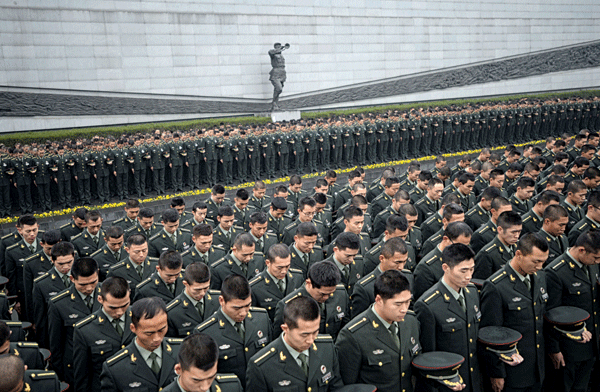 |
|
A symbolic total of 1,213 soldiers remember the deaths of Nanjing Massacre victims at the memorial hall on Wednesday. On Dec 13, 1937, the Japanese army occupied Nanjing and killed more than 300,000 Chinese civilians and unarmed soldiers, according to Chinese historical documents. CUI XIAO / FOR CHINA DAILY |
China's top leaders are scheduled to attend a state memorial ceremony on Saturday morning at the memorial hall for the victims of the Nanjing massacre.
On Dec 13, 1937, the invading Japanese army occupied the city in Jiangsu province and killed more than 300,000 Chinese civilians and unarmed soldiers, and raped tens of thousands of women in the following six weeks.
This year also marks the 69th anniversary of the Chinese War of Resistance Against Japanese Aggression (1937-1945). China, known for its peace-loving role throughout human history, long suffered from imperialist aggression which began with the first Opium War in 1840. Among all the invaders, the Japanese caused by far the greatest damage to China and its people, with the notorious Nanjing Massacre being the worst example of their brutality.
Rapprochement between China and Japan was within easy reach after the normalization of their diplomatic ties in 1972, especially because Beijing relinquished its claim for wartime compensation from Japan and the China-Japan Joint Statement that followed avoided the word "aggression" in describing Japan's wartime history.
In 1995, the then Japanese prime minister Tomiichi Murayama issued a statement expressing remorse over Japan's wartime invasion and atrocities on neighboring countries. His words helped Japan to improve its relations with its Asian neighbors, including China and the Republic of Korea.